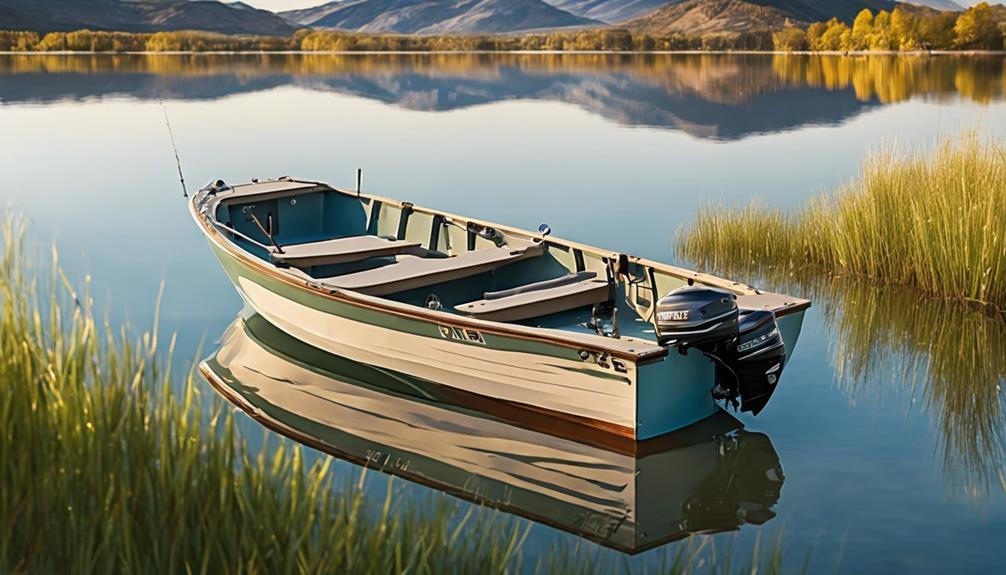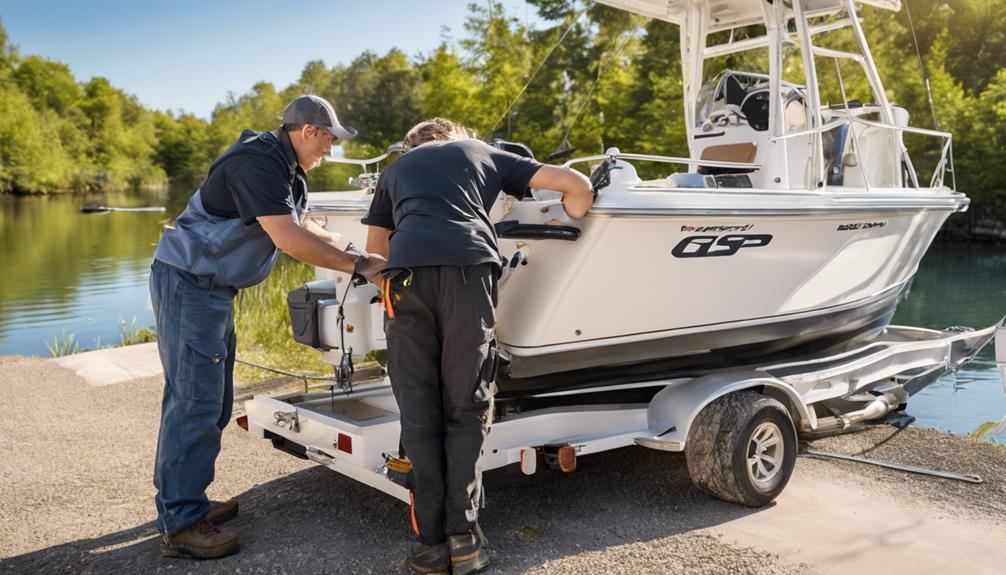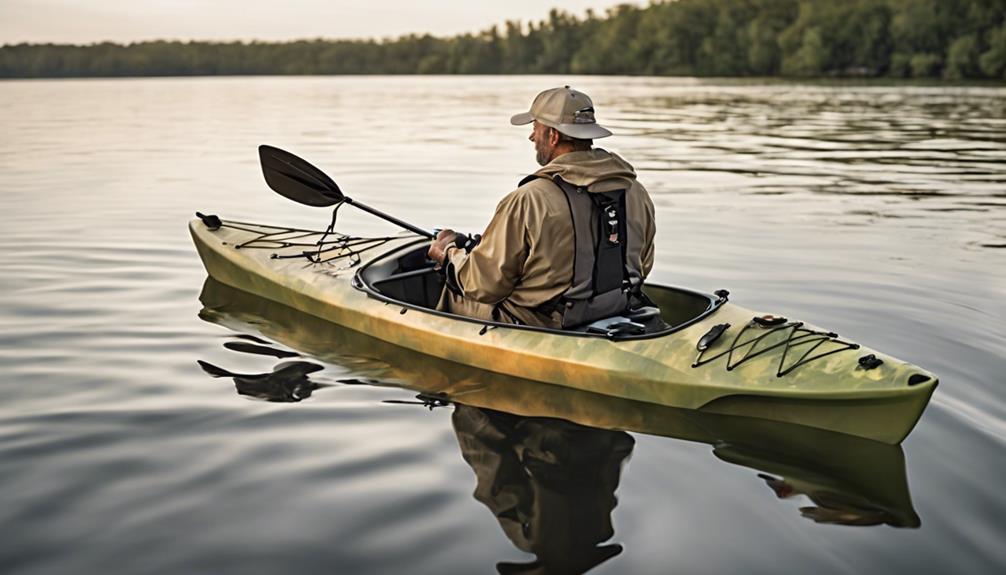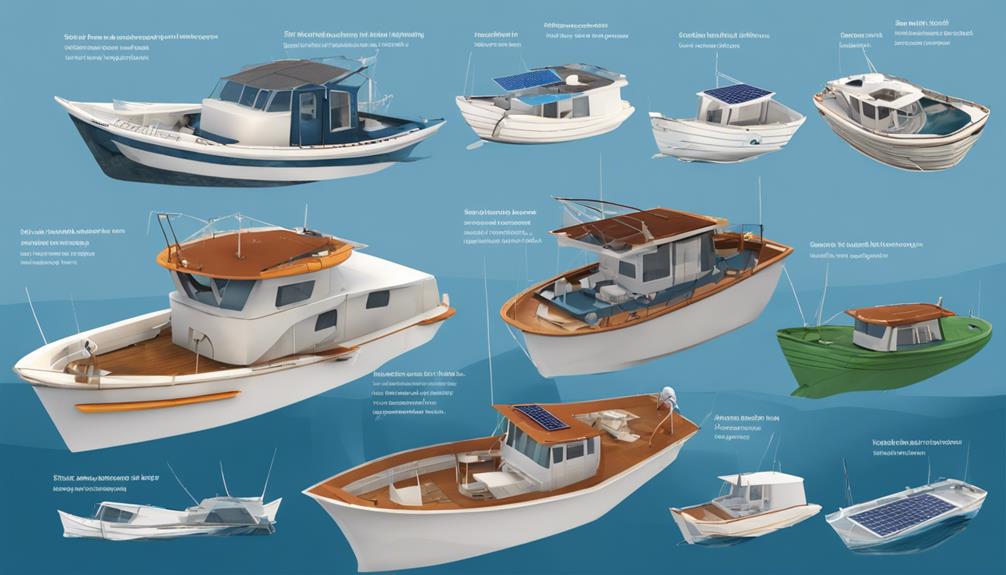When you're just starting out with fishing, choosing the right boat can make a big difference in your overall experience. Imagine yourself gliding across the water, casting your line with ease, and reeling in your first catch.
But before you set sail, there are essential factors to consider that can impact your fishing outings. From the type of boat that suits your needs to the equipment required for a successful day on the water, understanding the basics of fishing boats is crucial for beginners.
Types of Fishing Boats
When choosing a fishing boat, consider the different types available to find one that suits your needs and preferences. Two key factors to focus on are hull designs and deck layouts.
Hull designs play a crucial role in the performance and stability of a fishing boat. The most common hull types are flat-bottom, V-hull, and pontoon. Flat-bottom hulls are ideal for calm waters like lakes and ponds due to their stability, while V-hull designs are better suited for rougher waters as they cut through waves more efficiently. Pontoon hulls offer excellent stability and are great for leisurely fishing trips on calm waters.
Deck layouts are another important aspect to consider when choosing a fishing boat. The two main deck layouts are center console and dual console. Center console layouts provide ample space for moving around the boat and casting lines from different angles. On the other hand, dual console layouts offer more protection from the elements and additional seating options for passengers.
Size Considerations
Considering the appropriate size of a fishing boat is essential for ensuring a comfortable and efficient fishing experience. When choosing a fishing boat, factors such as seating options, weight capacity, maneuverability, and stability are crucial to consider.
Seating options play a significant role in the comfort of your fishing trip. A larger boat will typically offer more seating choices, allowing you to bring along more friends or family members. Additionally, having different seating areas can provide versatility during your fishing expedition, whether you prefer standing, sitting, or lounging while waiting for the fish to bite.
Weight capacity is another critical aspect to keep in mind when selecting a fishing boat. Ensuring that the boat can safely accommodate the weight of passengers, gear, and any potential catch is vital for both safety and performance. Overloading a boat can lead to instability and safety hazards, so always adhere to the specified weight guidelines provided by the manufacturer.
Moreover, maneuverability and stability are key considerations when it comes to the size of a fishing boat. Smaller boats are typically more maneuverable, allowing you to navigate through tight spaces or shallow waters with ease. On the other hand, larger boats often offer increased stability, especially in rougher waters, providing a smoother and more secure fishing experience. Balancing these factors based on your fishing preferences and needs will help you choose the right size boat for your fishing adventures.
Material Options
Choosing the right material for your fishing boat is crucial for durability and performance on the water. When considering material options, two popular choices are aluminum and fiberglass.
Aluminum boats are lightweight, durable, and relatively affordable, making them great budget options for beginners. They're easy to maintain and resistant to corrosion, ideal for fishing in freshwater and saltwater environments.
On the other hand, fiberglass boats are known for their sleek design, smooth ride, and longevity. While fiberglass boats may come with a higher price tag, they offer excellent performance and are easier to repair compared to aluminum.
Moving on to the traditional vs. portable options, wood and inflatable boats are worth exploring. Wood boats have a classic aesthetic appeal and are often handcrafted, providing a unique touch for fishing enthusiasts. However, wood requires regular maintenance to prevent rotting and warping.
Inflatable boats, on the other hand, are portable, lightweight, and easy to store. They're ideal for anglers looking for convenience and versatility, as they can be deflated for transport and inflated when ready to hit the water. Consider your priorities in terms of tradition, convenience, and maintenance when selecting between wood and inflatable boats for your fishing adventures.
Outboard Motors
To maximize the performance of your fishing boat, selecting the right outboard motor is essential. When it comes to outboard motors, two crucial factors to consider are fuel efficiency and horsepower options. Fuel efficiency is vital for long fishing trips, helping you save money on fuel costs in the long run. Horsepower options vary, so choose one that matches the size and weight of your boat for optimal performance.
In addition to fuel efficiency and horsepower, consider the steering systems and propeller choices for your outboard motor. The steering system should be easy to use and responsive, allowing you to navigate through waters with precision. Propeller choices impact the boat's speed and efficiency, so select one that complements your desired boating experience.
When selecting an outboard motor, make sure to match it with the size and weight of your fishing boat. An oversized motor can lead to excessive fuel consumption, while an undersized one may struggle to power the boat efficiently. By carefully considering fuel efficiency, horsepower options, steering systems, and propeller choices, you can ensure that your fishing boat operates at its best on every outing.
Storage Features
When outfitting your fishing boat, ensuring it has adequate storage features is crucial for organizing and protecting your gear. Tackle organization is a key aspect to consider. Look for boats with built-in tackle boxes or compartments to keep your lures, lines, and hooks neatly stored and easily accessible. Having designated spaces for different types of tackle will save you time and frustration when out on the water.
Another important storage feature to pay attention to is live well functionality. A live well is a compartment on the boat that holds water to keep your catch alive until you can either release it or bring it back to shore. Make sure the live well is well-maintained and has proper aeration to keep the fish healthy. Additionally, having a separate storage area for bait is beneficial to prevent it from spoiling or getting mixed up with your other gear.
Consider the overall layout of the storage features on the boat to ensure they're convenient and practical for your fishing needs. Having a well-organized boat won't only make your fishing trips more enjoyable but also help you focus on what matters most – catching fish.
Safety Equipment
Ensure your fishing boat is equipped with essential safety equipment to protect yourself and others while out on the water. Life jacket essentials are a must-have on any fishing boat. Make sure there are enough properly fitting life jackets for every person on board. Check that they're in good condition and readily accessible. It's crucial that everyone wears a life jacket while the boat is in motion. Familiarize yourself with emergency protocols and ensure all passengers know what to do in case of an emergency.
Floatation devices such as throwable cushions or life rings are important safety items to have on board. These can be used to assist someone who's fallen overboard or is struggling in the water. First aid kits are another essential safety item for your fishing boat. Stock your kit with basic medical supplies like bandages, antiseptic wipes, and pain relievers. Be sure to inspect your first aid kit regularly and replace any expired items.
In addition to the required safety equipment, consider investing in extra safety gear like a fire extinguisher, a whistle or air horn, and a flashlight. Being prepared for unexpected situations is key to staying safe on the water. Remember, safety should always be a top priority when enjoying your fishing adventures.
Fishing Accessories
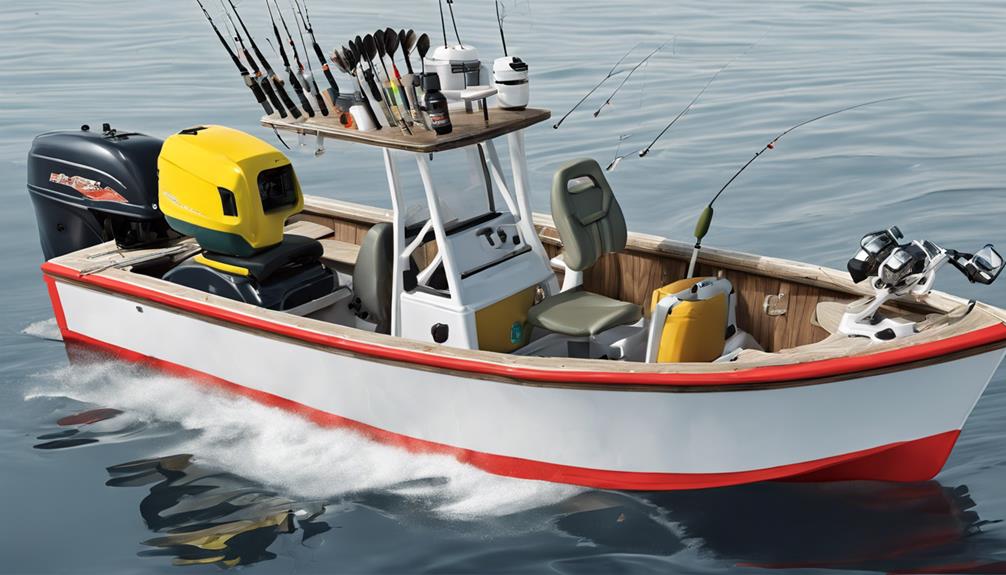
As you prepare for your fishing trip, consider the importance of selecting the right fishing accessories to enhance your angling experience. Tackle organization plays a crucial role in keeping your gear easily accessible and in top condition. Invest in tackle boxes with adjustable compartments to keep your lures, hooks, sinkers, and tools neatly organized. This not only saves time but also helps prevent tangles and damage to your equipment while on the water.
Another essential fishing accessory is fish finder integration. Fish finders use sonar technology to locate fish underwater, helping you identify the best fishing spots. Many modern fishing boats come equipped with fish finders, but you can also purchase portable units that can be easily mounted on your boat. Ensure that your fish finder is compatible with your boat and easy to read, providing you with accurate and real-time information to improve your chances of a successful catch.
Maintenance Tips
To keep your fishing boat in optimal condition, regular maintenance is essential. Neglecting maintenance can lead to costly repairs and potentially dangerous situations on the water. Here are some key tips to help you maintain your fishing boat effectively:
- Cleaning Techniques: Regularly clean your boat inside and out to prevent the buildup of dirt, grime, and salt deposits. Use appropriate cleaning products for different surfaces like fiberglass, metal, or upholstery. Rinse the boat thoroughly after each outing, paying special attention to the engine and propeller to prevent corrosion.
- Preventative Measures: Take preventative actions such as applying marine-grade wax to protect the boat's exterior, checking and greasing moving parts like hinges and steering mechanisms, and inspecting the hull for any signs of damage or wear. These proactive steps can help you catch potential issues early on and avoid more significant problems down the line.
- Troubleshooting Common Issues: Learn how to troubleshoot common boat problems like engine stalling, battery issues, or electrical malfunctions. Perform routine checks on the battery, fuel lines, and navigation lights to ensure everything is functioning correctly before heading out on the water. Familiarize yourself with your boat's manual to address minor issues promptly and efficiently.
Frequently Asked Questions
How Do I Properly Weigh Down a Fishing Boat for Stability in Rough Waters?
To properly weigh down your fishing boat for stability in rough waters, focus on balance distribution and ballast placement. Keep heavy items low and centered to improve wave handling.
Distribute weight evenly to enhance stability. Remember, proper ballast placement can make a big difference in how your boat handles in challenging conditions.
Take your time to ensure everything is secure and balanced for a smoother ride on the water.
What Are Some Common Navigation Tools Used on Fishing Boats?
When navigating on a fishing boat, it's key to rely on tools like GPS, compass, and charts. These navigation techniques ensure safety and help you reach prime fishing spots.
Are There Specific Regulations or Permits Required for Certain Types of Fishing Boats?
When it comes to fishing boats, specific regulations and permits may be required based on the type of vessel and the area you'll be fishing in. These regulations are put in place to ensure safety on the water and to protect marine life.
Make sure you have the necessary permits and follow all regulations to avoid fines or penalties. Additionally, always have the proper safety equipment on board to prevent accidents and ensure a successful fishing trip.
How Can I Maximize Fuel Efficiency on a Fishing Boat?
To boost fuel efficiency on your fishing boat, focus on engine maintenance. Regular tune-ups and clean filters can reduce fuel consumption. Checking propeller efficiency by making sure it's in good condition will also help.
Keep your cruising speed steady, as varying speeds can burn more fuel. By maintaining your engine and propeller, and being mindful of your speed, you can maximize fuel efficiency and enjoy longer fishing trips without worrying about running out of gas.
What Are Some Tips for Avoiding Common Fishing Boat Maintenance Issues?
To avoid common fishing boat maintenance issues, focus on rust prevention and engine maintenance.
Regularly inspect metal parts for signs of rust and apply appropriate protective coatings. Keep your engine well-maintained by following the manufacturer's guidelines for servicing and oil changes.
Conclusion
Now that you've learned about the basics of fishing boats for beginners, you'll be well-equipped to start your fishing adventures.
Remember to choose the right type and size of boat, consider the material and motor options, and prioritize safety and storage features.
Don't forget to stock up on fishing accessories and always maintain your boat properly.
With these tips in mind, you'll be ready to hit the water and reel in some big catches!
